“Girl with a Pearl Earring” is a novel about a sixteen year old beautiful girl, Griet who started working as a maid for eight stuivers a day in the Vermeer’s family in Holland
Griet met with peter and knew her neighborhood was affected by the dreadful disease plague. She went to see her brother Frans and he was annoyed hearing about the quarantine as no one ever told him anything. She requested Vermeer’s family to see her family on that very moment, but they rejected her request telling her that she might bring the disease in their home as it is contagious. She was able to clean the studio room as Vermeer was done with his work. Afterwards, Van Ruijvan came to Vermeer’s house along with his wife to see her drawn portrait and he wanted to know more about Griet with his lustful mind. Later, the quarantine ended up and she rushed at home to see her family. But she saw only her father and mother because the cruel plague has taken her little sister, Agnes forever. She was really upset and Maria Thins was not telling her as she was doing her work slow, but Catherina was tough on her as usual. Vermeer started painting once again the baker’s daughter, and started teaching Griet how to mix the color. Catherina gave birth to a boy, Franciscus and they had a blessing party at their house. Griet had to sleep now in the attic as a nurse had moved in to take care of weak Catherina and the newborn baby.
Griet started feeling good about living in the attic. Although she did not like being locked at night. She had a chance to help Vermeer in grinding and mixing the color, to see his paintings clearly. She was afraid of Catherina, but she was glad that at least Maria Thins know she was helping Vermeer in order to paint faster. Tenneke became mean to her as she was jealous about Griet living in the attic. She was kind of friendly to Maria and Catherina as she once saved Catherina from getting beaten up by her brother. Peter came to meet Griet’s parents in the church and her mother invited him for dinner. She also got the first kiss from Peter when he was leaving from her house. The painting of the baker’s daughter was done by this time and the baker’s family came to pick it. Vermeer started painting another portrait of Van Ruijvan’s wife. Griet has posed for Ruijvan’s wife when she was not available someday. Griet learned about the color of lights and came to know that Vermeer was a protestant like her before he was married to Catherina. Vermeer asked Griet one day to set the studio up as he was going to paint her.
On a Sunday Griet’s father said her, “You smell of linseed oil” She did not disclose to her parents nor to Peter that Vermeer was painting her. Peter wanted to see her hair but she refused as no dutch girls were allowed to uncover their hair before their marriage. Vermeer also asked Griet to unveil her head, but she refused. One day he gave her Catherina’s pearl earrings to wear in order to finish the painting. Leeuwnhoek told Griet that Vermeer liked her. Catherina was six months pregnant once again. Cornelia somehow figured out about the painting and notified her mother, Catherina. By the time, the painting was finished. Catherina was immensely upset and asked Vermeer why he did not paint her portrait even though she was her wife. Griet left the house being scared and married Peter, the butcher’s son who eagerly had been waiting for her. She had two sons and Tenneke came to her meat shop as Catherina wanted to see her. She met Catherina and saw she had eleven children. Catherina gave her those pearl earring she once gave pose because Vermeer left a note to give the pearl earrings to Griet before he died.



